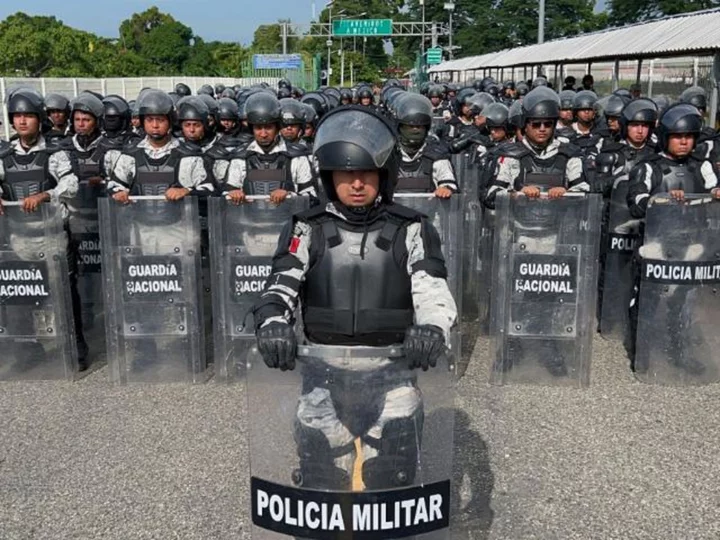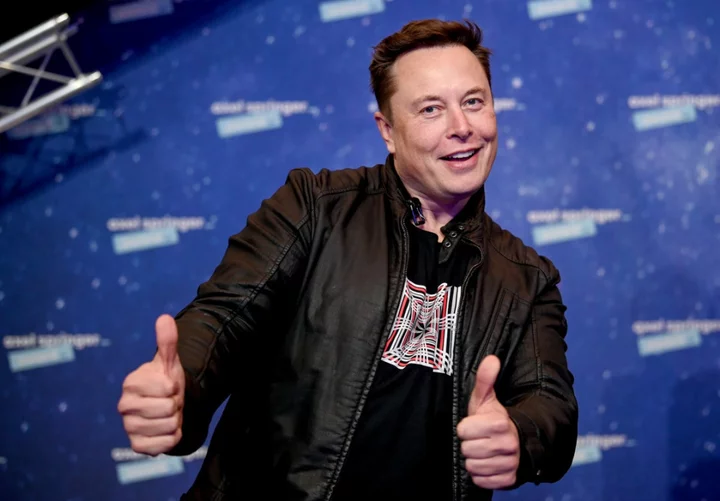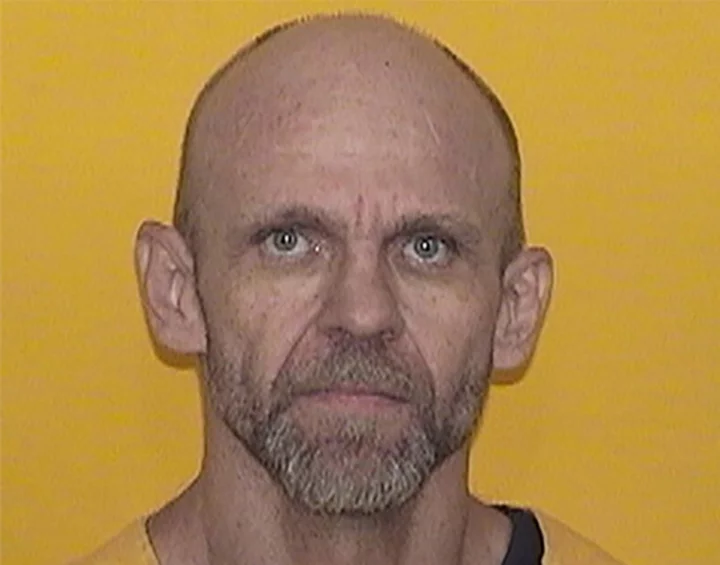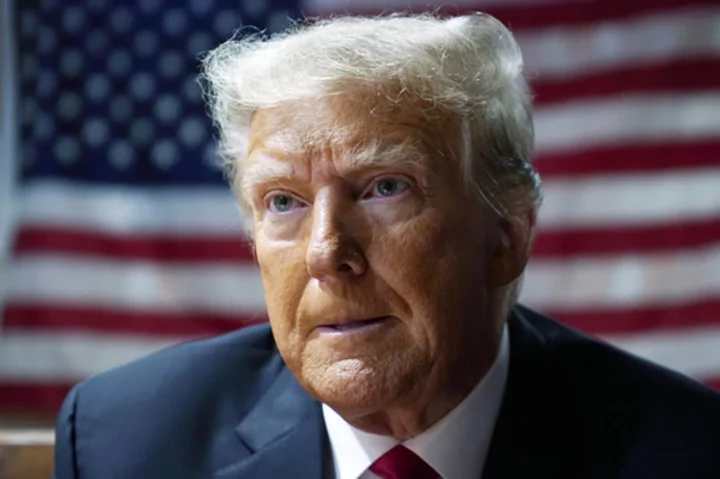Last month, as the Biden administration scrambled to manage the latest wave of migrants overwhelming the US southern border, top US immigration authorities crossed into Mexico for an emergency meeting.
Seated around a Ciudad Juárez conference room, the officials and their Mexican counterparts drafted a 15-point plan to help defuse the flashpoint -- most of it a checklist of actions for the Mexican government. Notably, according to a readout from Mexico's federal immigration agency, Mexico agreed to carry out more costly deportations of the migrants gathering on their side of the border -- a move that some believed would dissuade disorderly crossings.
The measures, which also specified Mexican efforts to clamp down on the crush of migrants riding north on railcars, are the latest in a series of policy shifts in Mexico that have alleviated, if slightly, the massive political headache in Washington caused perennially by migration. Analysts in both countries see a pragmatic bargain: as Mexico increasingly carries the weight of US immigration strategy, the Biden administration has granted rare leeway to the country's divisive but popular leader.
"Mexico has real leverage in the relationship with the US. And right now that leverage is around migration," said Andrew Selee, the president of the nonpartisan Migration Policy Institute.
Sharing nearly 2,000 miles of land border and a history of important economic exchange, Mexico and the US have long held intertwined immigration policies that adapted as international migration patterns shifted. When George W. Bush made his first trip out of the US as president in 2001, it was to the ranch of Vicente Fox, the Mexican leader, to discuss a new era of cooperation on border issues, like trade, drugs, and the northward flow of Mexicans, who at that time comprised the bulk of undocumented border-crossers.
But as spiraling violence and desperate economic conditions fueled years of mass migration out of Central America and the Caribbean to the US, overpowering the country's legal intake system, the stretch of Mexican territory in between became a critical "buffer state," said Maureen Meyer of the Washington Office on Latin America.
"The Mexico southern border pretty much was the US southern border," Meyer said.
Under pressure from several US administrations, Mexico has repeatedly sent resources to its border with Guatemala over the past 10 years to formalize migration routes and detained record numbers of migrants at newly installed checkpoints as they made their way north.
At the helm of Mexico's latest immigration coordination with the US has been President Andrés Manuel López Obrador, a leftist leader who in 2018 campaigned on resistance to doing the US's "dirty work" on migration. His political calculus has changed swiftly since then.
Crossing 'another line' in immigration enforcement
Under the threat of crippling tariffs from then-President Donald Trump, López Obrador agreed in 2019 to allow asylum applicants to wait out their claims inside Mexico under the "Remain in Mexico" policy, roiling activists who said it forced migrants into dangerous living conditions.
During the pandemic, when the US employed a public health measure known as Title 42 to turn around many asylum seekers at the border, López Obrador agreed to receive many of the migrants, reversing a long-standing position in the country and straining the resources of Mexico's own border cities. In May, as the US ended the use of Title 42, López Obrador continued to allow the returns on "humanitarian grounds."
"I think these more recent steps really do cross another line because it is not just stopping people from coming to the United States, which has been the more enforcer role," Meyer said.
"It is actually allowing people deported from the United States to either stay in Mexico, or in this case now, actually maybe actively returning them back to their home countries for the United States," she said.
Details on the deportation plan announced last month have been limited. In a news conference from Washington on Friday, Mexican Foreign Secretary Alicia Bárcena said that Mexican authorities were carrying out six flights each week to return migrants to Guatemala, Honduras, and El Salvador. Bárcena added that officials were "exploring" the possibility of expanding the returns to Ecuador, Venezuela, and Colombia.
It was unclear where the deportation flights were taking place and when they had begun. It also couldn't be learned if the migrants being returned had already been deported from the US or if they had pending asylum claims. Stakeholders in Mexico told CNN last week that there had not appeared to be any significant change in the pace of repatriation flights in the country's north.
A spokeswoman for Mexico's federal immigration agency declined to provide more details on the deportations.
But the announcement may already have had the effect of discouraging migrants from crossing to the US without the appointment required to seek an asylum claim. In the weekend that followed the meeting, the number of migrants encountered by border authorities entering the US near El Paso, Texas, fell by about 30%, CNN has reported.
Last Wednesday, López Obrador also announced that he was planning a summit with officials from several Latin American and Caribbean countries "whose populations are migrating" to be held in the coming days. Mexico also last month agreed to urge countries like Venezuela, Nicaragua, and Cuba — which have limited diplomatic relations with the US — to take back their citizens deported at the border.
"What we are looking for is to reach an agreement to confront the migration phenomenon by addressing the causes," López Obrador said at a news conference. "We have to align ourselves."
An uptick in shuttle diplomacy
The recent cooperation between the two countries has come with a busy schedule of shuttle diplomacy. Last week, Bárcena held meetings in Washington with Senate leaders and Elizabeth Sherwood-Randall, Biden's homeland security advisor. US Secretary of State Antony Blinken is expected to travel to Mexico this week along with other cabinet secretaries and meet with López Obrador.
For Mexican negotiators, the country's increased responsibilities have often been conditioned on a US commitment to grow the ways that migrants can enter the country legally, like through temporary work visas and a recently expanded humanitarian parole program that the Biden administration says has allowed tens of thousands of Cubans, Haitians, Nicaraguans, and Venezuelans who meet certain conditions, including a local sponsor in the US, to fly into the country and secure work authorization.
Last month, ahead of the announcement around Mexican deportations, Mexico's foreign minister told Bloomberg in an interview that the US and Mexico were nearing an agreement with the United Nations to pre-screen tens of thousands of migrants in Mexico for entry into the US under the parole programs. The US has opened similar processing centers in Colombia, Costa Rica, and Guatemala.
A United Nations High Commissioner for Refugees spokesperson told CNN that the organization is "regularly in contact with US and Mexican authorities including on how we can provide support to possible future initiatives."
"Politically for the Mexican government, they can't do enhanced enforcement without showing that they are also fighting for the well-being of migrants and for legal opportunities, because it is a country with a history of migration to the United States," Selee said.
A free hand for Lopez Obrador?
Still, some analysts see a more cynical incentive behind the cooperation, arguing that the Biden administration has largely turned a blind eye to elements of López Obrador's agenda that would have typically drawn rebuke.
"López Obrador very quickly understood that if he gave into Biden's request for support he would have significant political capital to ensure that US pressure on a number of either bilateral issues or domestic Mexican policy issues would be constrained," said Arturo Sarukhán, a former Mexican ambassador to Washington who has been a critic of the current administration.
Detractors point to democratic backsliding in a number of López Obrador's positions: an attempted reform of the country's independent election authority, frequent criticism of the judiciary and the press, and the capitulation of state powers on policing and transportation to the military.
The election reform, which was passed earlier this year but later blocked by the Mexican Supreme Court, diminished the country's independent election authority, cutting its workforce across the country and limiting its autonomy ahead of a presidential vote next year.
Tens of thousands of Mexicans marched on the capital against the policy in the largest opposition protest of López Obrador's presidency. Critics decried it as a dangerous erosion of democratic institutions.
But in Washington, the Biden administration was unusually muted. In a statement following the February protests, Ned Price, a senior adviser to Blinken, described "a great debate on electoral reforms on the independence of electoral and judicial institutions that illustrates Mexico's vibrant democracy."
"We respect Mexico's sovereignty. We believe that a well-resourced, independent electoral system and respect for judicial independence support healthy democracy," Price said.
If Mexico had less leverage in its relationship with the US, "I think that you'd see greater public pressure from the State Department, from the White House, on the slippery slope of democratic erosion that we're seeing in Mexico," Sarukhán said.
"I think the United States should be invested in Mexico's democratic strength because if not, what you'll have in Washington sooner or later is someone asking the question, 'Who lost Mexico and why?'" he added.









